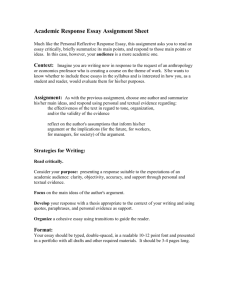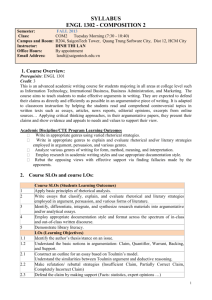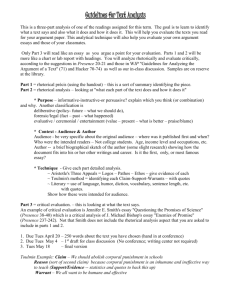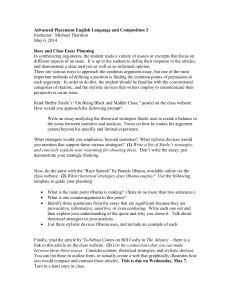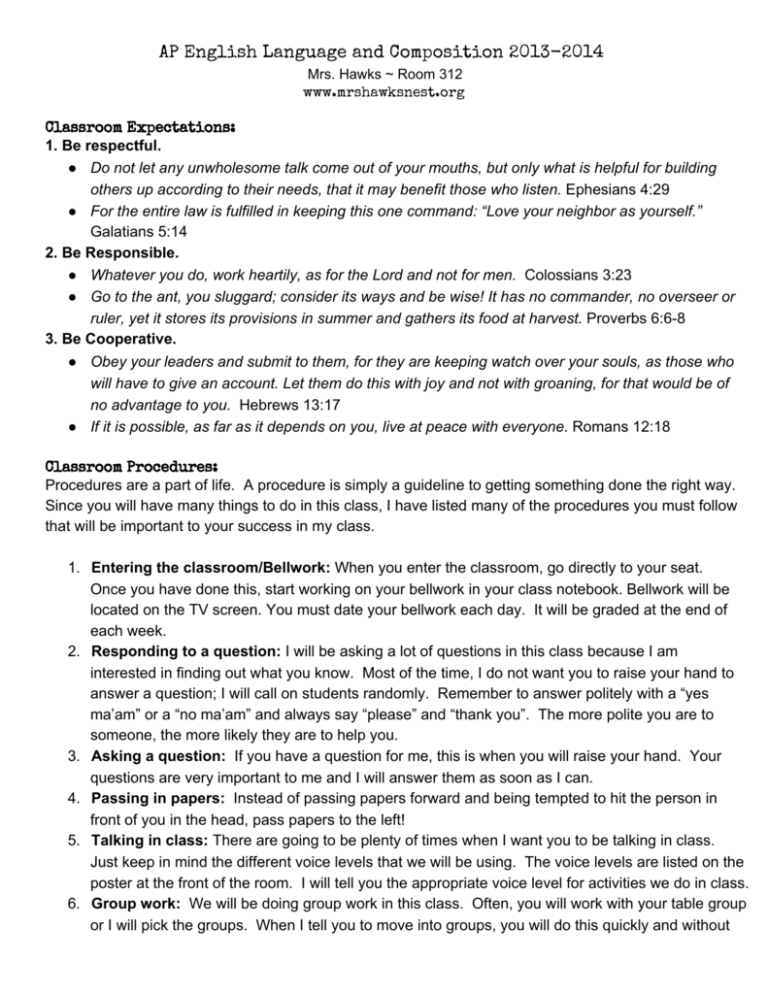
AP English Language and Composition 2013-2014
Mrs. Hawks ~ Room 312
www.mrshawksnest.org
Classroom Expectations:
1. Be respectful.
● Do not let any unwholesome talk come out of your mouths, but only what is helpful for building
others up according to their needs, that it may benefit those who listen. Ephesians 4:29
● For the entire law is fulfilled in keeping this one command: “Love your neighbor as yourself.”
Galatians 5:14
2. Be Responsible.
● Whatever you do, work heartily, as for the Lord and not for men. Colossians 3:23
● Go to the ant, you sluggard; consider its ways and be wise! It has no commander, no overseer or
ruler, yet it stores its provisions in summer and gathers its food at harvest. Proverbs 6:6­8
3. Be Cooperative.
● Obey your leaders and submit to them, for they are keeping watch over your souls, as those who
will have to give an account. Let them do this with joy and not with groaning, for that would be of
no advantage to you. Hebrews 13:17
● If it is possible, as far as it depends on you, live at peace with everyone. Romans 12:18
Classroom Procedures:
Procedures are a part of life. A procedure is simply a guideline to getting something done the right way.
Since you will have many things to do in this class, I have listed many of the procedures you must follow
that will be important to your success in my class.
1. Entering the classroom/Bellwork: When you enter the classroom, go directly to your seat.
Once you have done this, start working on your bellwork in your class notebook. Bellwork will be
located on the TV screen. You must date your bellwork each day. It will be graded at the end of
each week.
2. Responding to a question: I will be asking a lot of questions in this class because I am
interested in finding out what you know. Most of the time, I do not want you to raise your hand to
answer a question; I will call on students randomly. Remember to answer politely with a “yes
ma’am” or a “no ma’am” and always say “please” and “thank you”. The more polite you are to
someone, the more likely they are to help you.
3. Asking a question: If you have a question for me, this is when you will raise your hand. Your
questions are very important to me and I will answer them as soon as I can.
4. Passing in papers: Instead of passing papers forward and being tempted to hit the person in
front of you in the head, pass papers to the left!
5. Talking in class: There are going to be plenty of times when I want you to be talking in class.
Just keep in mind the different voice levels that we will be using. The voice levels are listed on the
poster at the front of the room. I will tell you the appropriate voice level for activities we do in class.
6. Group work: We will be doing group work in this class. Often, you will work with your table group
or I will pick the groups. When I tell you to move into groups, you will do this quickly and without
talking. While working in your group, everyone will be given a specific job to do so that no one
gets stuck doing all of the work. Working in teams is a valuable lesson that you will use for the rest
of your life.
7. Getting your attention: When the entire class is working and “abuzz” and I need your attention, I
will simply raise my hand until everyone is quiet and facing me, ready to listen.
8. Going to the restroom: You will be given 4 restroom passes each 9­weeks on which you will
write your name. You will only be permitted to use the restroom if you give me a pass. You may
not use any other student’s passes. If I am in the middle of teaching, I may ask you to wait before I
let you go. The only restrooms you may use are the ones across from the office or the ones by the
Band Room. Restroom breaks are not a chance to wander the hallways and if you abuse the
privilege, you will lose it.
9. Leaving your seat: For safety reasons, I ask that you stay in your seat until I give you permission
to get up and move around.
10. Sharpening pencils, getting tissues, hand sanitizer: If you need to do one of these things
during you must raise your hand and ask before you get out of your seat, especially if I am
teaching.
11. Storing your stuff: The only materials that should be on your desk are the materials required for
my class. All other materials, books, bags and/or purses must be under your seat.
12. Borrowing my supplies: I have pens, pencils, erasers and other supplies available to you if you
need to BORROW something. Borrowing means you are to return it. If you borrow a pencil at the
beginning of class, you must return it before you leave class. I am not an office supply store.
13. Nurse/Office: If you need to see the nurse or go to the office, tell me when you enter the
classroom. You must have a hall pass to leave my classroom. If you are feeling sick during class,
raise your hand and ask for a pass to see the nurse. You cannot go to the nurse without a pass.
14. Announcements/Visitors: Unless you are working on your own, the voice level must
immediately go to “0” so we all can hear the announcements or I can hear the visitor speaking to
me.
15. Tardiness: If you are tardy to class, you must have a note from a teacher/office worker. Do not
interrupt the class upon entering the room. The school policy will be followed. Any work missed
because of an unexcused tardy may not be made up.
16. Cell Phones/iPods: All electronic devices must be turned “OFF” during school hours. If I see a
phone or iPod, I will take it and give it to Mr. Atwood. You can retrieve it from him at the end of the
school day.
17. End of Class: The bell system is for the teachers’ information only. The bell does not dismiss the
class, I dismiss the class. When the bell rings, you will remain in your seat until I dismiss you. Do
not start packing up your things until after I have dismissed you.
Classroom Discipline:
If you fail to meet classroom expectations or follow classroom procedures, the following discipline
process will be followed:
1. Verbal Warning
­I will make sure you know exactly what behavior you need to correct.
2. ½­Hour Detention to be served in my classroom after school.
­You may have to serve more than one day, depending on the offense.
3. Office Referral
­If you continually misbehave in my classroom, Mr. Dunckel will handle the consequences,
which will be stronger.
Absences/Make-Up Work:
1. If you are absent the day an assignment is due or a test is scheduled and were in school the day prior,
you will be required to submit due work or take the test upon return.
2. You will be required to submit work from an excused or unexcused absence.
3. If you missed school, then you missed something! You are responsible for obtaining make­up
assignments. I will not chase you down to make sure you get your work. Make­up work will be located in
a designated place in my classroom
4. You must complete make­up assignments on your own time, not class time.
5. You will have the same number of days you missed to turn in your work.
6. Upon request, your parents may pick up your assignments during your absence, provided at least
24­hour notice is given.
Class Website:
We will frequently be using my class website to post assignments. Also, all important class documents
and handouts will be posted on the website frequently for your convenience. More information about the
class website will be provided to you within the first few weeks of school.
www.mrshawksnest.org
Core Texts for AP English Language and Composition
Textbooks:
DiYanni, Robert. One Hundred Great Essays. New York: Pearson Longman, 2008. Print. (selections)
Kinsella, Kate, ed. al. Prentice Hall Literature: The American Experience. 8th ed. Upper
Saddle River: Pearson, 2010. Print.
Odell, Lee, Richard Vacca, and Renee Hobbs. Holt Elements of Language: 5th Course. Austin:
Holt, Rinehart and Winston, 2009. Print.
Shea, Renee H, ed. al. The Language of Composition. 2nd Edition. Boston: Bedford/
St. Martin’s, 2013. Print. (primary text)
Novels:
The Poisonwood Bible by Barbara Kingsolver (summer reading)
The Adventures of Huckleberry Finn by Mark Twain
The Great Gatsby by F. Scott Fitzgerald
The Scarlet Letter by Nathaniel Hawthorne
Additional Texts:
Barron’s AP English Language and Composition Workbook, 5th Edition
Past AP Exams
Additional books, articles, video and sound recordings, and essays will be used as needed.
Course Outline
This outline is intended to represent the general course structure and may need to be adjusted as the year
progresses to meet student needs.
Summer Reading
● Using Google Documents online, students will submit a total of 10 Literary Response Journals for the
following written works:
● The Poisonwood Bible by Barbara Kingsolver
1. Book One: Genesis & Book Two: The Revelation
2. Book Three: The Judges
3. Book Four: Bel and the Serpent
4. Book Five: Exodus
5. Book Six: Song of the Three Children & Book Seven: The Eyes in the Trees
●
One Hundred Great Essays complied by Robert DiYanni
1. “Learning to Read and Write” by Frederick Douglass, pg. 216­221
2. “Never Do That to a Book” by Anne Fadiman, pg. 261­265
3. “Mother Tongue” by Amy Tan, pg. 690­696
4. “Just Walk on By: Black Men and Public Spaces” by Brent Staples, pg. 651­654
5. “Naps” by Barbara Holland, pg. 343­346
First Semester
Our school year is split into 2 Semesters, but for the sake of this class, I will base our units of study on
quarters.
First Quarter
*Outside Reading: Students will read The Scarlet Letter by Nathaniel Hawthorne to prepare for class
discussion and written assignments in Unit #3 at the end of the quarter.
Unit #1: Introduction to course and review/discussion of Summer Reading
­ Shared Inquiry discussion of The Poisonwood Bible
­ Introduction of Class Website
­ Reading/Writing assignments on related non­fiction to TPB
­ The differences between Language analysis and Literature analysis
­ use the essays assigned for summer reading as examples
­ Students will take the 2007 AP English Language and Composition exam (multiple choice to enhance
student understanding of what they will be able to accomplish and also to provide a baseline score of
their performance in order to compare it later in the year.
Unit #2: An Introduction to Rhetoric
­ Focuses on the foundational skills and terms rhetorical analysis
­ Chapter 1 of The Language of Composition
­ Rhetorical Triangle
­ SOAPStone
­ Ethos, Pathos, Logos
­ Effective & Ineffective Rhetoric
­ Glossary of Rhetorical Terms
­ Culminating Activity: Students will read and analyze several texts relating to the
Moon Landing
­ Thesis statement practice
­ Part 1 of They Say, I Say: What Others Say, Summarizing, and Quoting
­ AP Central Curriculum Module: “Introducing Rhetorical Analysis Through Documentary Film”
­ Grammar/Syntax Focus: The “Non­Negotiable” List
­ Vocabulary Focus: Primary Rhetorical Terms and Content Vocabulary
­ Introduction to Socratic Seminar: supplement with Ch. 11 of They Say, I Say
­ Weekly Class Website assignments:
­ “Sinners in the Hands of An Angry God” by Jonathan Edwards
­ Current Events/Essays and Editorials
­ AP Style Multiple Choice Quiz
Unit #3: The Art and Craft of Analysis
­ Continue focus on foundational rhetorical analysis skills and the techniques
used in the analysis essay
­ Chapter 2 of The Language of Composition
­ Close Reading and Annotation
­ Style Elements of Writing (Glossary)
­ Writing an Analysis Essay
­ Analyzing Visual Texts/Advertisements
­ Culminating Activity: JFK’s Inaugural Address
­ Part 2 of They Say, I Say: Ways to Respond, Naysayers, Why it Matters
­ Grammar/Syntax Focus
­ Mini­Lesson: The Diction Ladder / Tone
­ Vocabulary Focus: Rhetorical Devices and Content Vocabulary
­ In­class activities, including Socratic Seminar, and short essays to practice rhetorical analysis
­ Weekly Class Website assignments: analyzing current events, essays, speeches, editorials, and
other pieces of rhetoric
­ “Set of 9” ­ Students will evaluate and “score” a set of 9 student written analysis essays
­ Timed Essay: Analysis Essay chosen from a past AP Language & Composition
Exam
­ Graded Socratic Seminar: The Scarlet Letter
­ Writing on Text: Students will carefully analyze selected passages of The Scarlet Letter that suggest
Hawthorne’s various rhetorical purposes.
­ AP Style Multiple Choice Quiz
Second Quarter
*Outside Reading: Students will read The Adventures of Huckleberry Finn by Mark Twain to prepare for class
discussion and written assignments in Unit #4.
Unit #4: Analyzing Arguments
­ Shift focus from analyzing rhetoric to argument and the skills needed to both analyze argument and
write the argument essay
­ Chapter 3 of The Language of Composition
­ What are the components of argument?
­ Claims & Evidence
­ Shaping an Argument: Classical, Rogerian, Inductive, Deductive
­ The Toulmin Model: Analyzing arguments and warrants
­ Logical Fallacies (Glossary)
­ Part 3 of They Say, I Say: Connecting the Parts, Using Your Voice
­ In­class activities, including Socratic Seminar, and short essays to practice writing arguments in
various structures (Classical, Rogerian, Inductive, Deductive)
­ Weekly Class Website assignments: analyzing current events, essays, speeches, editorials, and
other pieces of rhetoric. Include creating argument/staking claims
­ Grammar/Syntax Focus
­ Vocabulary Focus: Logical Fallacies, Rhetorical Devices, Content Vocabulary
­ “Set of 9” ­ Students will evaluate and “score” a set of 9 student written argument essays
­ Timed Essays: Argument Essay chosen from a past AP Language & Composition Exam (one written
classically, another written with Rogerian)
­ Graded Socratic Seminar: The Adventures of Huckleberry Finn
­ Writing on Text: Students will read two literary criticisms of Huck Finn: “Say it Ain’t So, Huck” by Jane
Smiley and “Huck, Jim, and the American Racial Discourse” by David L. Smith and choose a side to
argue based on the question: Is The Adventures of Huckleberry Finn a racist text?
­ AP Style Multiple Choice Quiz
Unit #5: The Researched Argument Paper (Term Paper)
­ We will begin the required American history/literature based researched argument paper, using
MLA style as described in Elements of Writing FifthCourse.
­ Students will choose their topic based on significant events/people in American History. Then,
students will create a claim focused on that topic from which they will develop their researched
argument.
­ Students will be asked “to present an argument of their own that includes the analysis and synthesis of
ideas from an array of sources.”
­ We will cover “research skills, and in particular, the ability to evaluate, use, and cite primary and
secondary sources.”
­ Students will be guided through topic selection, thesis development, research techniques, note taking,
outlining, drafting, and source documentation.
­ Their progress will be monitored by the teacher with individual conferences andwith extensive
feedback and revision of the students’ first drafts. They will be required to turn in Xeroxed copies of their
source materials to enable the
instructor to assess their handling of the original material.
­ Due Dates will be determined in November and will continue into the 3rd quarter.
First Semester Exam –
Students will take the 2007 AP Language & Composition Released Exam (multiple choice) and their grade will
be determined on the “rate­of­change” from the baseline score set at the beginning of the school year.
Second Semester­
Third Quarter ­ Researched Argument Paper will continue throughout this quarter, both in­class and
independently.
Unit #6: A Seminar on Satire
­ “Laying the Foundation ­ Satire: The Oldest Trick in the Book” unit plan
­ apstrategies.org
­ Techniques of Satire
­ Analysis of satirical texts
­ Reading Selections: “A Modest Proposal” by Jonathan Swift, selections from “The Onion”, selections
from Dave Berry, selections from Mark Twain
­ Socratic Seminar
­ Visual/Auditory Satire
­ TV/Movie parodies: “The Simpsons”, “The Daily Show”, etc.
­ Podcasts and pop culture satire
­ Vocabulary Focus: Satirical Terms, Content Vocabulary
­ Writing on Text: “Choose a topic / situation in your life akin to Swift’s. Outline your rhetorical
situation—audience, purpose, exigency—and write a satire of your own. You should also write a
comparison / contrast paragraph in which you show how your writing connects with “A Modest
Proposal” and any of the pieces presented / studied.”
­ Weekly Class Website Assignments: students will research and post textual and visual satire in a blog
forum and respond to each others’ posts with analysis
­ AP Style Multiple Choice Quiz
Unit #7: Synthesizing Sources
­ Focus will return to rhetorical analysis with an emphasis on the skills needed towrite the synthesis
essay.
­ Chapter 4 of The Language of Composition
­ Using Sources to inform and argument and appeal to an audience
­ Writing a synthesis essay
­ In­class activities, including Socratic Seminar, and practice synthesis essay using “Culminating
Activity” in textbook: “The Dumbest Generation?”
­ Weekly Class Website assignments: analyzing current events, essays, speeches, editorials, and
other pieces of rhetoric. Include creating argument/staking claims, and synthesis of texts
­ Grammar/Syntax Focus
­ Vocabulary Focus: Rhetorical Devices, Content Vocabulary
­ “Set of 9” ­ Students will evaluate and “score” a set of 9 student written synthesis essays
­ Timed Essay: Synthesis Essay chosen from a past AP Language & Composition Exam
­ Graded Socratic Seminar: The Language of Composition Chapter 6 “Community” selected essays
­ Writing on Text: Students will choose from a list of reading chapters in The Language of Composition
and read the central and classic essay and choose two of the other essays to read. Then, students will
write a synthesis essay utilizing those four sources (prompt will be given to them upon their choice of
chapter).
­ AP Style Multiple Choice Quiz
Fourth Quarter
Unit #8: Review and Test Prep
­ Focus will be on reviewing the major skills and vocabulary needed for rhetorical analysis, argument,
and synthesizing sources.
­ Use of Barron’s AP English Language and Composition Workbook, 5th Edition
­ Grammar and Syntax Review
­ Vocabulary Review
­ 3 Timed Essays: Synthesis, Analysis, and Argument from past AP Exams
­ Chapter 13 of The Language of Composition: Politics
­ Multiple Choice practice
­ Synthesis Project with small groups
Unit #9: From Language to Literature
­ Focus will be on transitioning students to AP English Literature & Composition, which many will take
the next school year.
­ Literary Unit: The Great Gatsby by F. Scott Fitzgerald
Additional Sources:
"Course Descriptions: English Language & Composition." ApCentral.collegeboard.com.N.p., 2010. Web. 26
June 2012. <http://apcentral.collegeboard.com/apc/public/repository/ap english­course­description.pdf>.
Graff, Gerald, et. al. They Say I Say with Readings. 2nd Edition. Norton: New York, 2012.
Puhr, Kathleen M. "AP English Language & Composition: Teacher's Guide."
APCentral.collegeboard.com. N.p., 2007. Web. 26 June 2012.
<http://apcentral.collegeboard.com/apc/members/repository/ap07_englang_teachersguide.pdf>
Prestwick House AP Literature Unit: The Great Gatsby
“Using Documentary Film as an Introduction to Rhetoric”. AP Language & Composition 2008 Curriculum
Module. <http://apcentral.collegeboard.com/apc/public/repository/AP_CurricModEnglish.pdf>


